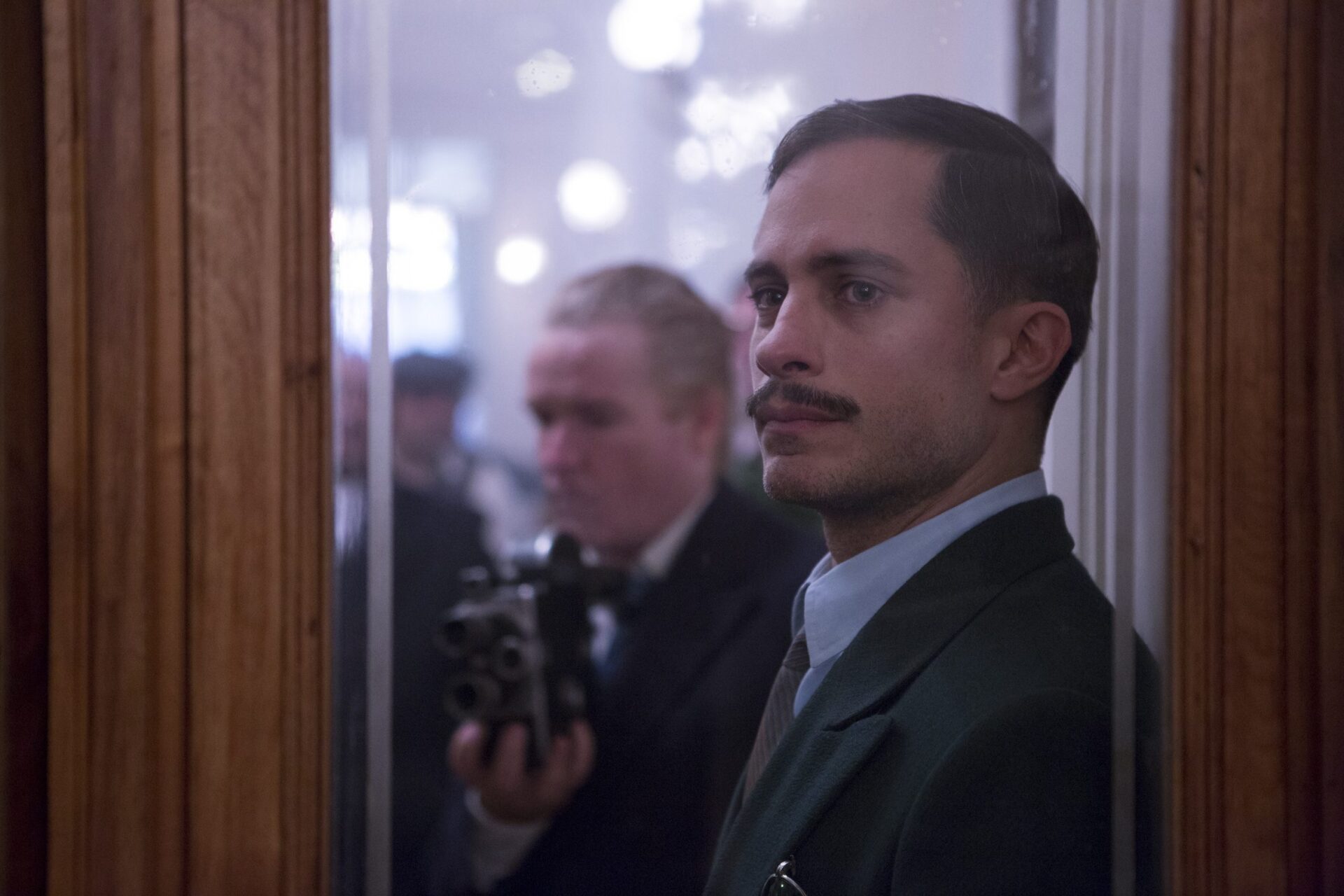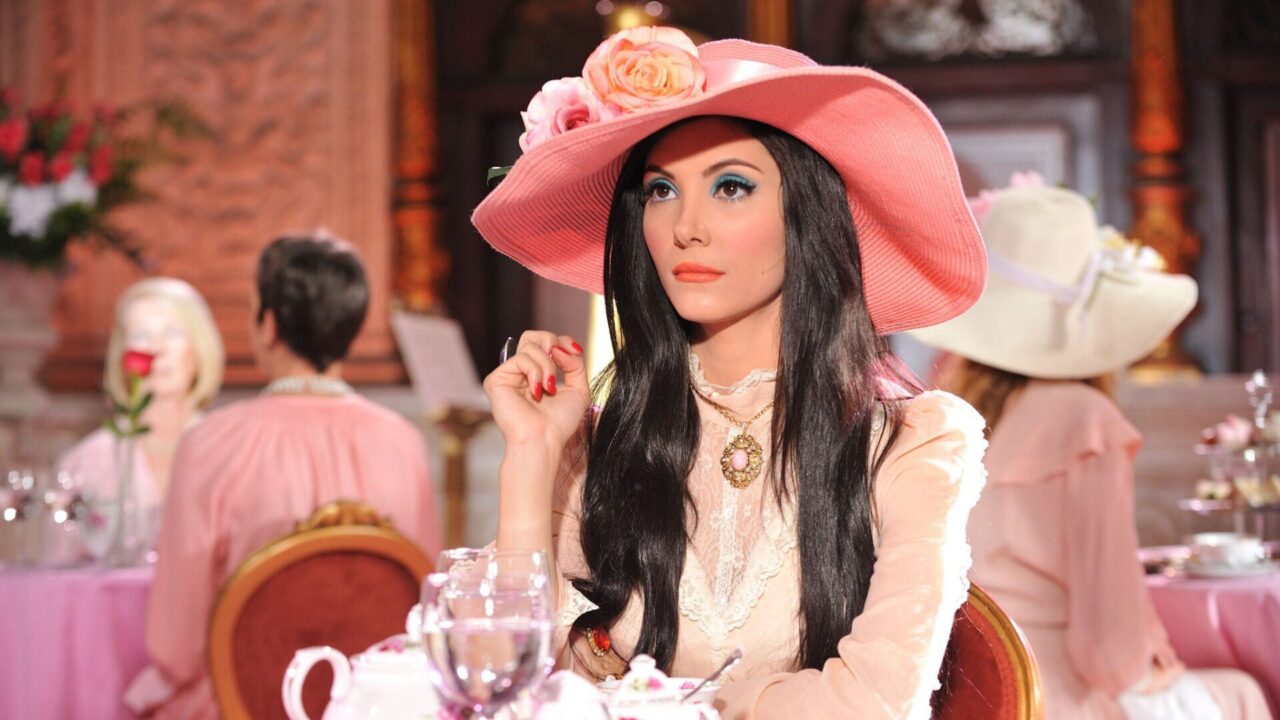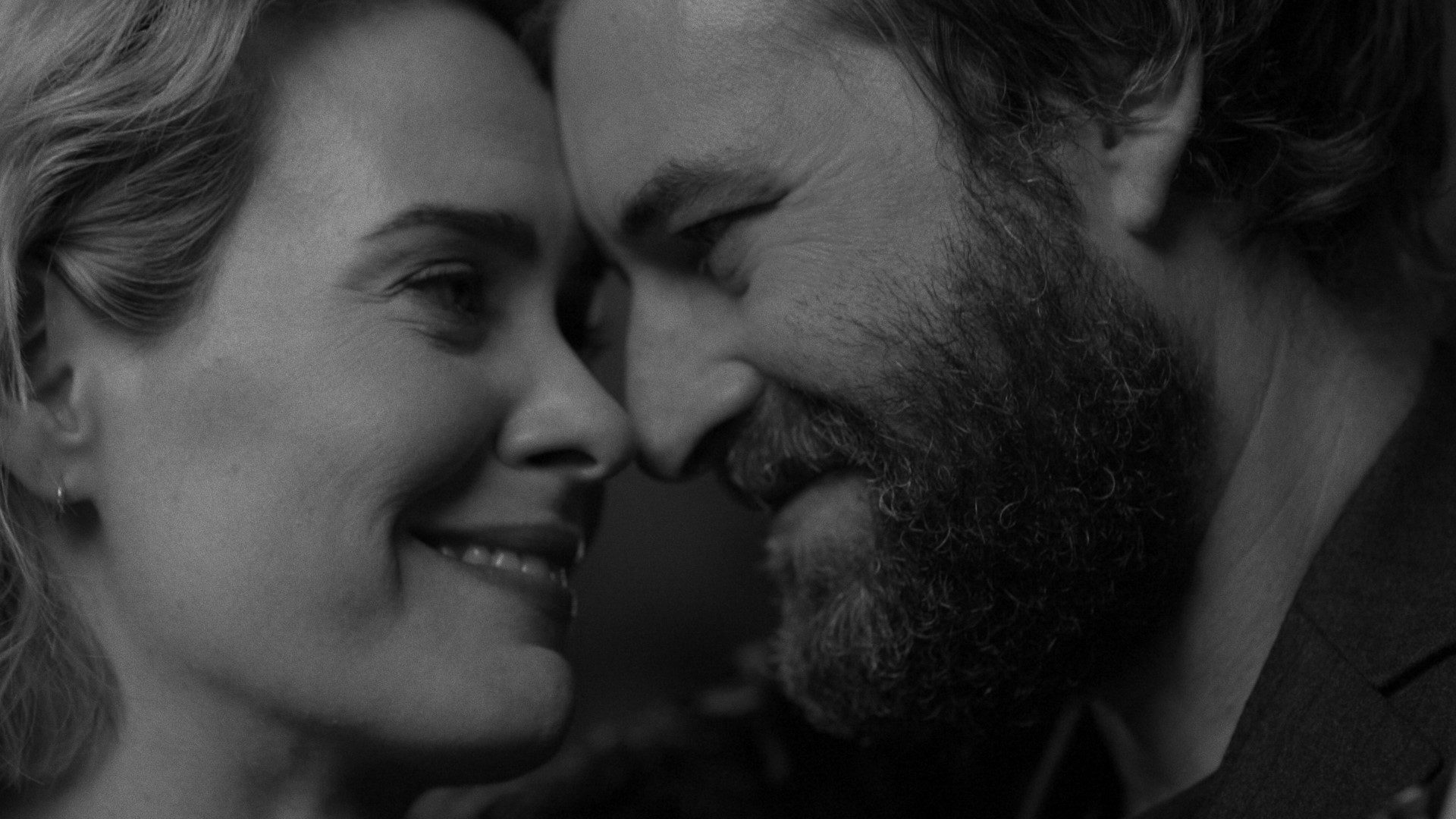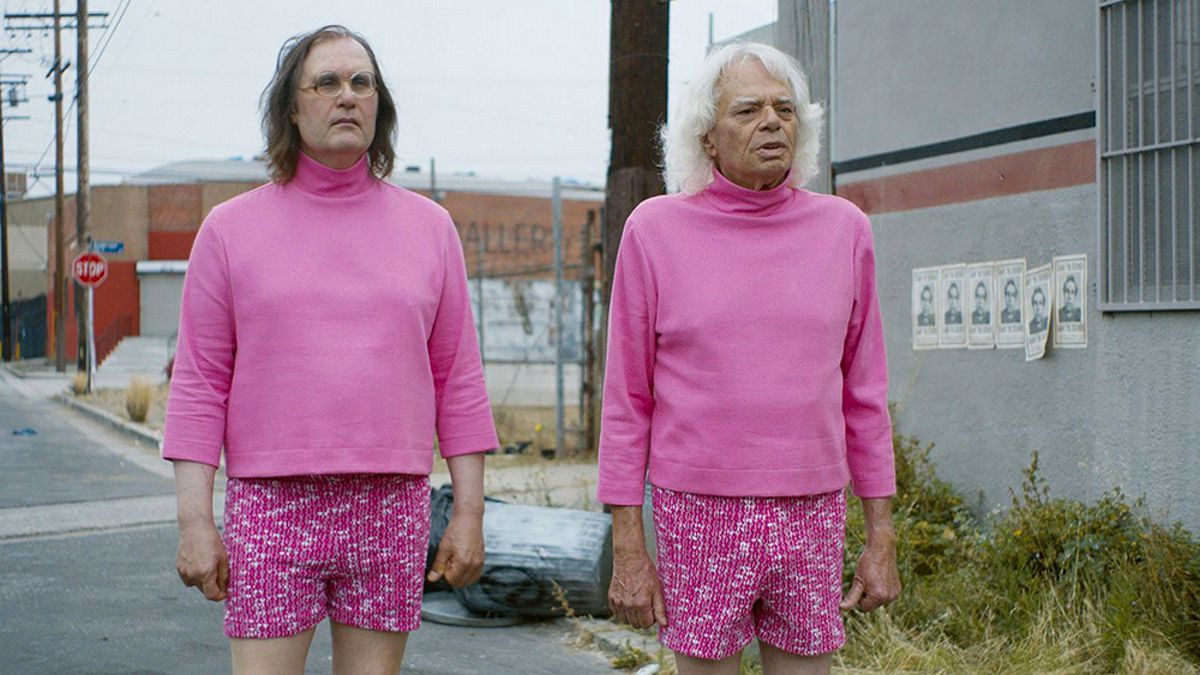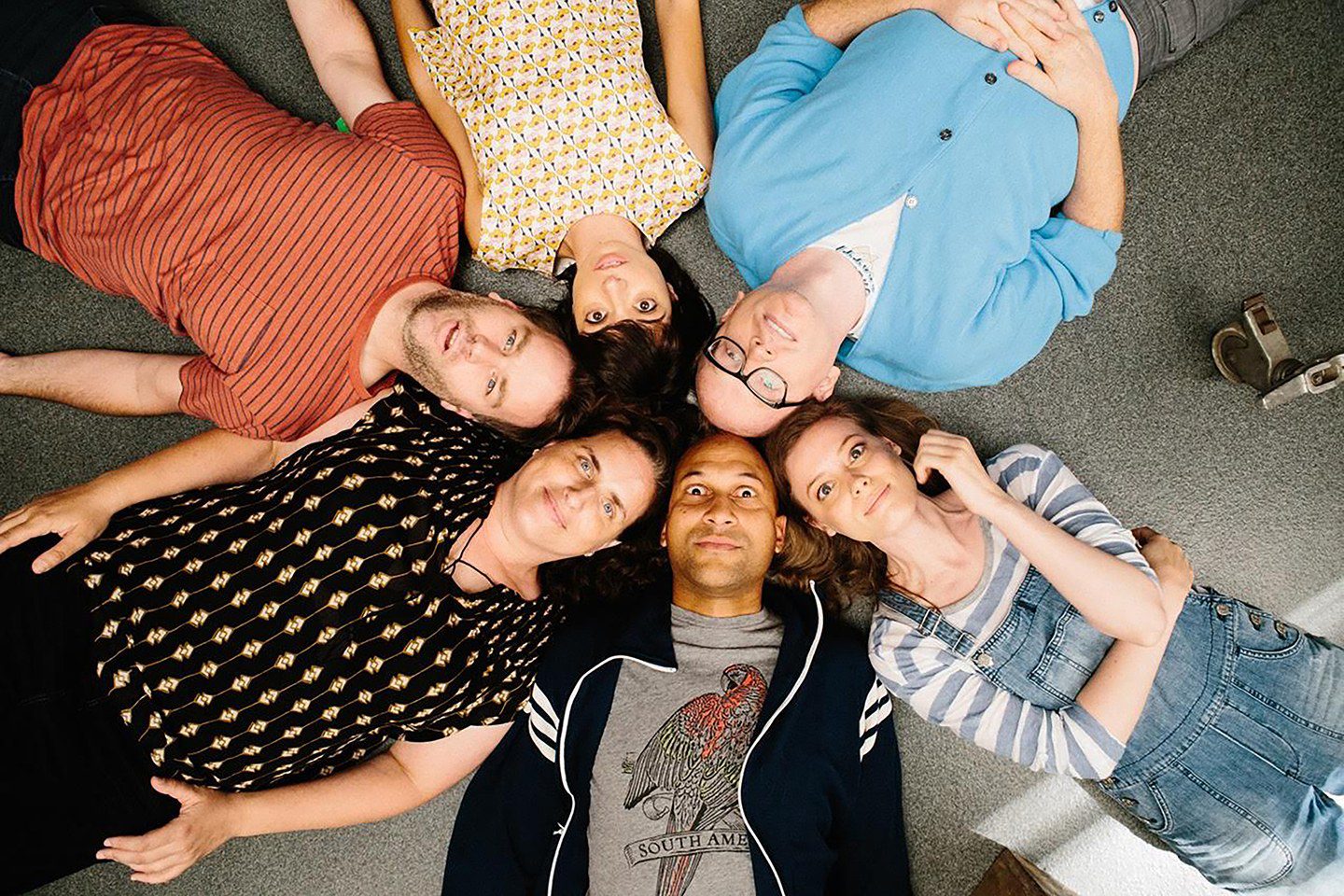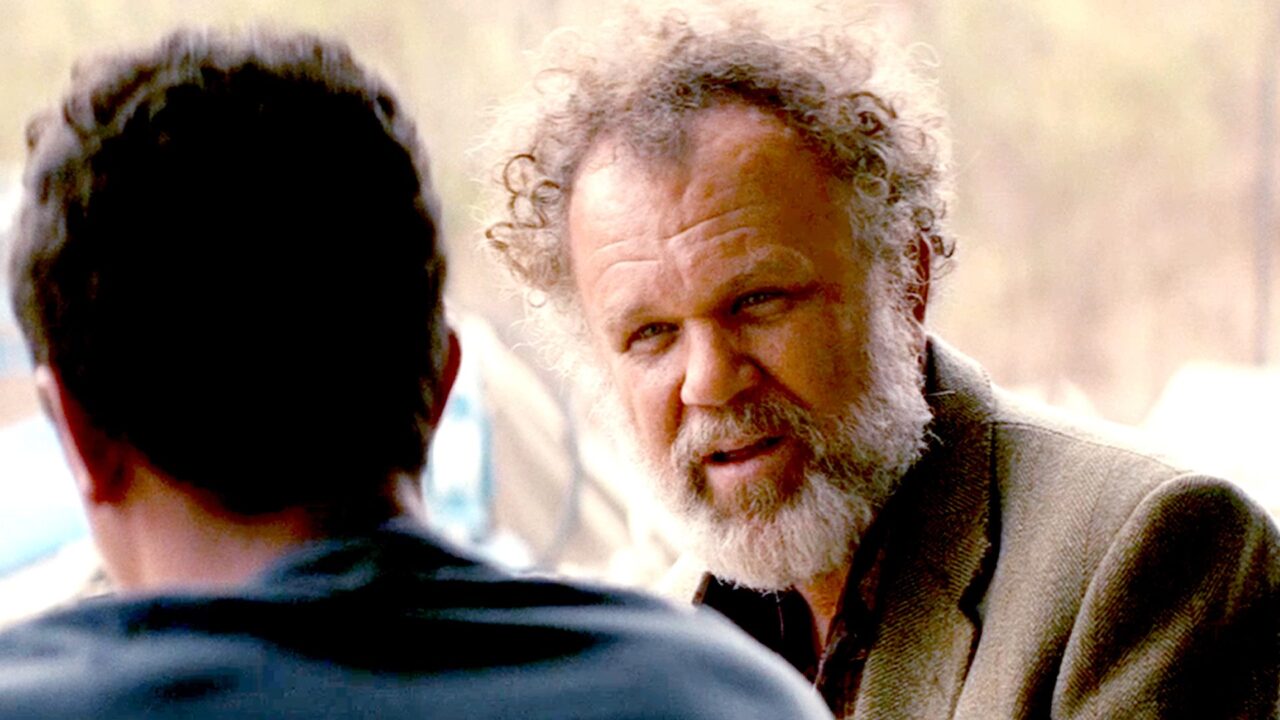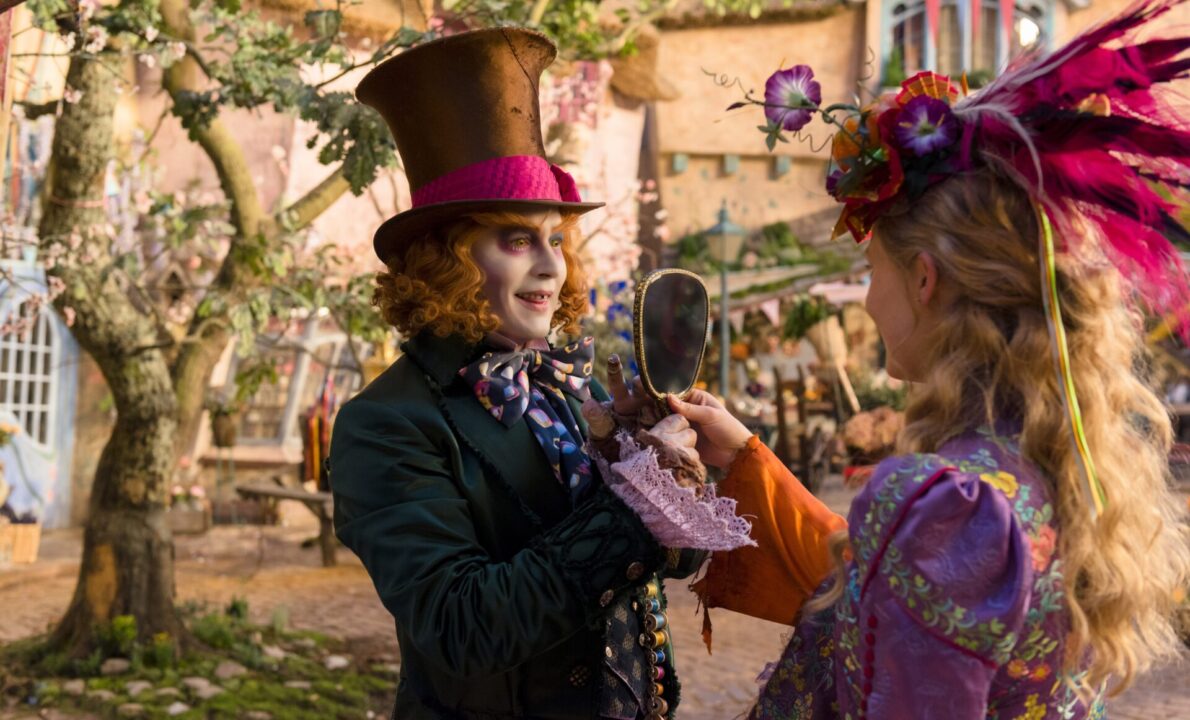'Neruda' Review: Director Pablo Larraín Ends Year on a High Note with Poetic Biopic
There is something remarkable about that about a film that not only tells the story of a poet but makes the tale poetic.
While the rest of the world seems to be crumbling, Pablo Larraín is having a monster year. The past twelve months have seen the release of not one, not two, but three critically-acclaimed features that he has directed. "The Club," released stateside in February, was his home country Chile’s submission for last year’s Best Foreign Film category at the Academy Awards. A mere few weeks ago, his Jackie Kennedy biopic, "Jackie," found itself in instant awards conversations upon its release. And finally, Larraín slips in one last film before the year’s end with another biopic, "Neruda," profiling a famed citizen of his own country, the poet Pablo Neruda.
With "Neruda," like "Jackie," Larraín chooses to look specifically at a key pivotal moment in the complicated life of a political figure. Neruda (Luis Gnecco), also a member of the Chilean Senate, is a stark critic of president Gabriel González Videla. After denouncing him and his anti-communist policies, Neruda risks his livelihood and goes into hiding for his outspoken views. Soon, he is hunted down by inspector Óscar Peluchonneau (Gael García Bernal), who fervently pursues him for years, while waxing his own bit of poetic sentiments about the state of the country and his place in it.
" "Neruda" further transcends conventions of biopics and storytelling, and may be the most exciting of Larraín’s films thus far."
On the surface, "Neruda" is not too far removed from Larraín’s higher-profile "Jackie." Both are rather unconventional glimpses into unconventional figures. The films themselves play with narrative form, in the same way that the characters play with politics and their own public persona. They both feel, at once, impressionistic and expressionistic. Quiet, but loud. Simple, but bursting with intelligent conversation and stimulating ideas that are essential to our current American political climate. "Neruda" further transcends conventions of biopics and storytelling, and may be the most exciting of Larraín’s films thus far.
Perhaps what sets "Neruda" apart not only from "Jackie" but many other biopics is its dexterity in two things. One, of course, is its tone. While its palette is rather dark, it feels light on its feet. Meditative, but present and ready to maneuver through Larraín’s wealth of ideas and inventive form. Like "Jackie," "Neruda" explores the mythology behind a figure, but where the former can be occasionally heavy-handed, "Neruda" feels less inclined to make statements, but rather reflect. The myth of Pablo Neruda and the facts of Pablo Neruda blur, but that is okay, even in a biopic. There is something remarkable about that about a film that not only tells the story of a poet but makes the tale poetic.
'The Love Witch' Review: A Feminist Approach to the Classic Witchcraft Story
The midnight movie has been having a moment as of late, breaking down genre and gender barriers to reveal themes deeper and more complicated than expected in horror and camp filmmaking. A Girl Who Walks Home Alone At Night, The Babadook, The Witch and Under the Shadow have found something very rich in the mystique of the feminine psyche that has enriched their own gripping terror with rich, authentic themes. The Love Witch, while not particularly frightening, is the latest in the line of these feminine-focused midnight films, but also unique in that lineage as well.
The Love Witch is the tale of Elaine (Samantha Robinson), a beautiful, sensuous witch who uses her powers to fulfill her desperate quest for love. She moves to a small town north of the California Redwoods - also populated with practitioners of her similar magic - and instantly begins to seduce local townsmen. When the first of these men, a local college professor, goes missing after an evening with her in his cabin in the woods, a local investigation begins. The detectives on the case soon fall under her spell, beginning a chain of mystical and malevolent occurrences.
At its best, The Love Witch is a triumph for director Anna Biller, showcasing her eye for style and sense of homage. Her understanding of the intricacies of 60s melodrama and 70s exploitation films is uncanny and often brilliant. The color, the costumes, the sets are all impeccable, not just in their recreation, but simply as visual fun. The key, though, to Biller’s success with this film lies in something more subtle. It’s the way in which she molds the performance patterns to the eccentricities of the eras the film takes from. The hammy, but never annoying, delivery. The slowly reactive editing. It all fits so well but is never limiting. If anything, it shows Biller’s keen attention to detail for the art of filmmaking, not simply the art of homage.
And while perhaps the story itself does fall occasionally flat due to slow pacing, the modernity of the themes is consistently fascinating. The Love Witch’s keen feminist approach to the classic witchcraft story is befitting and it’s modernity makes it so refreshing. There is something to be said about creating thought-provoking work out of materials so campy, but it is Biller’s trust in her material and form that makes The Love Witch an exciting breakthrough and an exciting new voice in filmmaking.
'The Love Witch' is not rated. 120 minutes. Now playing at The Nuart in West L.A. (Q&A with actress Samantha Robinson and principal cast members this weekend, details below)
Fri Nov 11, 7:00pm show w/Q&A*
Sat Nov 12, 7:00pm show w/Q&A
Sun Nov 13, 4:00pm show w/Q&A
*With Filmmaker Anna Biller
'Moonlight' Review: This Light Shines On New Voices in American Cinema
In an age of franchises and blockbusters, it’s funny that a film like Moonlight feels so monolithic. It is a coming-of-age story that is both expansive and so personal– not only to the filmmakers and talent involved but personal to every occupied theater seat. It is a necessary and vibrant depiction of race and sexuality in America during a divisive time in this country, yet it does not feel political. It is a chorus of exciting new voices in American cinema, yet it is a quiet, patient feature. It is a film that feels like a landmark, for not only this moment but for years to come. So to speak, Moonlight is a blockbuster in its own way.
Moonlight follows a young African-American man named Chiron on his journey to find the definition of manhood. Framed as a triptych, the film sees a different actor play Chiron in three key moments of his youth. As a young kid, Chiron confides in a drug dealer whom he considers a father figure, while his mom’s own addiction rises. Years later, as a high school student, Chiron struggles to decipher his sexuality after developing feelings for the only classmate that shows him respect and friendship. Later, as a young adult, Chiron has established a tough persona as a dealer, yet finds himself struggling with his masculinity after reconnecting with a classmate.
One of the most apparent successes of Moonlight is the casting of Chiron in all three stages of his life. Despite not particularly resembling each other, the three young men cast evoke the same personality through more subtle details of speech and body language. But in a sense, it feels almost fitting that the three manifestations of Chiron feel so eerily similar, yet look distinctly separate. The power of director Barry Jenkins’ character study is that, through Chiron, he is not telling the story of one young black man growing up in America, but thousands. Chiron is a character that deals with some similar tribulations that often limit people of color in film, however, Moonlight shows his struggles with so much more than the average character as he is forced to deal with misgivings about his masculinity, sexuality, and family. In this way, the film transcends toward the annals of not just a great film, but an essential one.
Jenkins continues the conversation that he started in his first and only prior feature, Medicine for Melancholy. Charming as it was, his debut was conversational and frequently ham-fisted for a film that didn’t fall far from the early ‘mumblecore’ movement. In form, Moonlight could not be more different. Operatic in its scope, yet gentle in its expression, Moonlight is Jenkins’ butterfly. There is an intimacy to how Jenkins and cinematographer James Laxton follow their characters without interfering with their reactions to the environment. As filmmakers and dramatists, this guidance proves to be their greatest gift; it results in a film both refined and poetic, while staying raw and pure.
'Moonlight' is rated R for some sexuality, drug use, brief violence, and language throughout. 110 minutes. Opening at the ArcLight Hollywood and the Landmark on Friday, October 21st.
'Blue Jay' Review: A Warm Telling of the Complexities of Lost Love
Independent cinema, of recent, is often marked by witty millennial musings on love, aging, and nostalgia. Much of these conversations have been written and captured in some way by ‘mumblecore’ alumni like Joe Swanberg, Lynn Shelton and, of course, the Duplass Brothers. The veteran’s leap into television has allowed them the ability to evolve with larger audiences and larger budgets to create some of the most exciting work of their careers. But what happens when their characters grow up? Blue Jay, written by and starring Mark Duplass, may shed some insight on that.
Blue Jay begins when high school sweethearts Jim (Mark Duplass) and Amanda (Sarah Paulson) run into each other at the market in their old mountain hometown. Jim, who has recently quit his construction job, has returned to clean up his family home; Amanda, who is married with two teenage children, has returned to visit her pregnant sister. After catching up over coffee, they spend the day together, rekindling their old friendship.
Director Alex Lehmann pulls a two-hander as director and cinematographer and in both roles, he works quiet magic. The decision to shoot the film in black and white proves to be a warm touch to a film about the comforts and complexities of nostalgia and lost love. It gives Blue Jay the feeling of a dream. Not only does the monochrome work on a narrative level, but it also looks gorgeous - elevating a quaint indie drama into something much more elegant and classic.
It is increasingly exciting to see the Duplass Brothers’ work gaining a melancholic dynamic that a lot of their earlier projects seemed to lack. Blue Jay may be their (well, in this case, it’s mostly Mark Duplass’ show, playing lead and serving as sole screenwriter) most tender work to date. Duplass, himself, is quite remarkable in what may be his finest performance. Sarah Paulson is magnetic as well. Her use of body language elevates the often mundane dialogue. Their chemistry together is what keeps the film alive. While the conversations are never overly-stimulating, the way in which Duplass and Paulson use their eyes, their smiles, and their hands speak leagues. You can see love, longing, and loss louder in their actions than in words, something that not only shows a strong actor acting upon strong direction, but reveals something much more universal than good, quaint conversation.
'Blue Jay' is not rated. 80 minutes. Now playing at Sundance Sunset Cinema and on VOD.
'The Greasy Strangler' Review: A Midnight Theater Favorite in Waiting
Usually, a movie review is introed with a fun statement about the film and the context of its genre, or perhaps some other fun history. However, there isn’t usually a film like The Greasy Strangler– a surreal bit of raunch and debauchery that walks a fine line between being scary, being funny, and simply being weird. It’s a distinctly unusual film, but that does not make it any less fun. The debut feature from Jim Hosking is a midnight theater favorite in waiting, a marvelous artifact of cinematic anti-humor camp.
The Greasy Strangler tells the tale of the dysfunctional and downright bizarre escapades of father and son duo, Ronnie (Michael St. Michaels) and Brayden (Sky Elobar). By day, they lead mediocre tours of the disco hotspots of yesteryear throughout Los Angeles. By night, Brayden works on his fantasy novels while Ronnie tends to his wildly unhealthy habit of eating ultra-greasy meals. After Brayden becomes smitten with a customer, Ronnie becomes more hostile toward his son. This, along with a rise in stranglings around town, leads Brayden to suspect his father is the titular culprit, a grotesque creature known as the 'The Greasy Strangler.'
It would be easy to write off The Greasy Strangler as just campy. It is intentionally campy, after all, and that is part of its initial magnetism: the repetitious humor executed with cringeworthy delivery, the fantastic and quite literally eye-popping practical effects, the bizarro fashion sense that is appropriately stuck in the 70s, yet inappropriately revealing, Andrew Hung’s goofy, but oh-so-catchy synth score etc. While many modern camp films are framed as intentional homages to distinct eras of film history - i.e. 80s horror, 70s exploitation - The Greasy Strangler only takes nods to the past but feels oddly refreshing, and perhaps even forward-thinking. Its anti-humor plays like a live action adaptation of a Nickelodeon cartoon written by John Waters, directed by Jared Hess.
What makes The Greasy Strangler work is that it is charming in a way that most weird-for-weird’s-sake aren’t. Ronnie is truly despicable, but there is a charisma to him that makes it hard to turn away - even when he is walking through a car wash with a carrot-sized prosthetic johnson hanging about. As is Brayden, endearing, yet miserable. There is a surprising depth to each, a complexity that keeps you intrigued in the surrealist world Hosking has created. Their dynamic is surprising dynamite, despite their shared comedic bits wearing rather thin by the end of the film. A lot of the chemistry is due to all-in performances from Michael St. Micheals and Sky Elobar, but it also comes from a thoroughly unrelenting and inventive film that trusts in the world it creates.
'The Greasy Strangler' is not rated. 93 minutes. Now playing at Cinefamily and on demand.
In 'Don't Think Twice,' Mike Birbiglia Shows the Heart and Humor in an Improv Troupe
This review originally ran on June 10th, 2016 during the Los Angeles Film Festival
Mike Birbiglia’s first feature, 2012’s "Sleepwalk With Me," was one of the more interesting and promising directorial debuts of the former half of the decade. Birbiglia, who also starred in the film, buoyed the adaptation of his own stand-up routine with rare honesty and awkward charisma that made for one of the better examinations of comedy and the creative process of recent filmography. Relentlessly charming, but perhaps too slight for its own good, "Sleepwalk With Me" cemented Birbiglia as a triple threat to watch. His newest film, "Don’t Think Twice," finds him diving deeper into the comedy world with a wider appeal, but with the same wonderful perspective of life on the outskirts from stardom intact.
Birbiglia stars as Miles, a longtime Improv 101 teacher, and ringleader of his mildly popular NYC improv troupe, The Commune, including the spunky Samantha (Gillian Jacobs), who has to confront the professional drive of her TV-minded boyfriend Jack (Keegan-Michael Key); the gawky Bill (Chris Gethard) who is dealing with his elder father’s waning health; Lindsay (Tami Sagher), a thirty-something stoner still living with her wealthy parents, and the quiet Allison (Kate Micucci) is struggling to complete a graphic novel she has been working on for the better part of a decade. The Commune is both their getaway and the anchor in their anxious lives. But, after Jack gets a regular role on "Weekend Live" (an uncanny satire of "SNL"), each individual in the troupe begins to rethink their life’s trajectories and their meanings within their friend circle.
One of few disappointments of Birbiglia’s "Sleepwalk With Me" was his lack of visual confidence. While "Don’t Think Twice" does not call for anything fancy itself, there is an understated beauty and softness to the cinematography that enhances its tonal tenderness. Birbiglia, as it seems, is less concerned with cinematics and more concerned with chemistry, and the character’s said chemistry sure does pop. While the film isn’t as particularly laugh-out-loud funny as may be expected, the dialogue is extremely punchy and in perfect tempo. Much of the humor comes not from jokes, but from very authentic, marvelously played situations. Again, Birbiglia proves he has a very keen knack for finding both heart and humor in the creative struggle. He and his cast have a rare understanding of the comedy in strife that always steers the emotional beats away from any puddle of schmaltz. For a comedian, a professional more often finding emotion in words, Birbiglia and his actors create drama through the emotions his characters hold in–a technique that pays off immensely in a few later beats.
At its surface, "Don’t Think Twice" may be about comedy, but it’s a snapshot of a very familiar period in the lives of not only creatives, but all types of people confronting a certain kind of adulthood and responsibility. It is refreshing to find a movie that looks at showbiz–a smaller corner of showbiz, at that–and doesn’t try to satirize itself too much which can often alienate. For "Don’t Think Twice," the Improv world is the glue that holds the characters together, but it is Birbiglia’s characters and their hopes and anxieties that are the glitter that makes the film sparkle.
"Don't Think Twice" is rated R for language and some drug use. 92 minutes. Now playing at the Landmark Theatre.
'Les Cowboys' Review: A Directorial Debut Influenced By 'The Searchers'
Thomas Bidegain has built a steady career in the last half decade as the narrative collaborator of Jacques Audiard, the celebrated French director behind "A Prophet," "Rust and Bone," and last year’s Palme d’Or winner "Dheepan." While much of the success from these films can be attributed to Audiard’s distinctive and powerful dramatic skills as a director, Bidegain’s subtle hand of crafting palpable drama from the more simple reaches of European society is a true gift. While his written skills need no further proof, his directorial debut "Les Cowboys" provides a strong case for his talents as a director as well.
"Les Cowboys" begins in a small, eastern French subculture that has a fond affection for the cowboys and the American West: their music, their clothing, etc. Alain (François Damiens) is popular amongst the sect and entertains his friends with endearing renditions of country western classics. After a tender delivery of “Tennessee Waltz” at a cowboy festival, he and his family discover their daughter has disappeared, eloping with her Muslim boyfriend to live under Islam. His quest to find her becomes an exhausting intercontinental search that only stiffens his already tough personality and soon, his son (Finnegan Oldfield) becomes deeply involved in continuing the search following the events of 9/11.
"Les Cowboys" may not be a classic like "The Searchers," but it is a solid debut from a talented cinematic author.
The primary influence of director Thomas Bidegain’s debut is John Ford’s seminal western "The Searchers." Or perhaps, influence is too light of a word, as "The Searchers" provides a complete narrative blueprint for "Les Cowboys." It’s a much slower burn than the American classic, which is a great strength of the film, but also one of its faults. The simmering tension enhances the thematic tirelessness and exhaustiveness. It also allows a story so steeped in elements of its cowboy cinema influences, to develop in a very naturalistic sense. The drama doesn’t feel manufactured, it feels authentic. On the other end, however, the film can feel very monotonous. While the “action” does ramp up in the latter half, it can frequently feel awkward.
Unlike many films that explore the tumultuous post-9/11 situation in the Middle East as loud and chaotic, "Les Cowboys" presents it, appropriately, like the American West; it’s quiet, ordered and rather elegant (the rich cinematography is a highlight), but the line of who’s good and bad, right and wrong, is rather unclear. That is the greatest strength of "Les Cowboys" and much of Bidegain’s work – he moves with instinct as opposed to a calculated cinematic narrative. "Les Cowboys" may not be a classic like "The Searchers," but it is a solid debut from a talented cinematic author.
"Les Cowboys" is rated R for a brief violent image and a scene of drug use. 104 minutes. Now playing at Laemmle's Royal Theater in Santa Monica.
Lighter in Tone, 'Alice Through the Looking Glass' is More Disheveled Than Its Predecessor
"Alice in Wonderland" is one of the world’s great “modern” fairy tales. Okay, well, Lewis Carroll’s original novel is nearly 150 years old, so to call it modern would be hardly accurate. But looking at this decade’s affinity for modernizing the classic fables of lore and dressing them up with lots of CGI, dashing them with a cup of angst and coating them in 3D to boost those box office numbers, no movie is more greatly responsible than Tim Burton’s 2010 blockbuster adaptation of "Alice In Wonderland." Six years and nearly a dozen remakes later, "Alice Through the Looking Glass" falls into theaters.
"Alice Through The Looking Glass" is perhaps a misleading title as the story only begins with Alice (Mia Wasikowska) finding her back to Wonderland through a mirror at a luxurious party. Once there, she finds the Mad Hatter (Johnny Depp) literally withering away in defeat from his family's disappearance many years ago. After finding a paper hat that he thought his father tossed away, he is convinced they are still alive, and thus, Alice sets out to change history by meeting Time (Sacha Baron Cohen) and see if she can keep the Hatter alive.
The key themes of "Alice Through the Looking Glass" is actually time and history. It is a lofty idea that the film explores with a very adventurous spirit. It's a lighter ride than Tim Burton's characteristically dark original (is that cool to call it the original in this case?). Though its tone may be lighter, however, this entry is a whole lot more complicated. The story unravels as an incoherent mess, attempting to merge upwards of three separate storylines into a cohesive narrative. In the beginning, Alice is frustrated with her place as a woman in high society, instead wanting to be a ship's captain. Then the story becomes the Mad Hatter's tale. Then Time's struggle takes over, only to be thwarted by an origin story about the Queen of Hearts. It's a movie that is both a sequel and a prequel and, really, neither feels very urgent and necessary.
The film then becomes a feat of "set-piece engineering" so to speak, the same kind of storytelling expected on a theme park ride; the narrative threads all loosely connect, but they are secondary to "oh hey, this looks cool!" wonders of production design. And, much like the 2010 original, the design is rather zany in a wonderful way. Rich colors and textures that Lewis Carroll himself would be proud of. Look closely though and the gimmickry shows very clearly, especially in 3D. Sometimes, the effects wizardry is outstanding (i.e. any of Alice's wonderland friends), but there are sequences where the CGI is embarrassing in certain scenes, especially a laughable time-mobile chase between Alice and Time that is reminiscent of a mediocre early 2000's sci-fi television program. In this way, the erratic visual quality of Wonderland becomes rather distracting.
Mia Wasikowska and Sacha Baron Cohen both do their very best and are as magnetic as usual. They cannot save the ship, unfortunately. The film represents a rare misstep for Disney– a studio that has had a rather impressive year for reinventing classic stories with not only technical wizardry but true narrative heft. Unfortunately, this seems to be their weakest film in nearly a decade.
"Alice Through The Looking Glass" is rated PG for fantasy action/peril and some language. Now playing in theaters everywhere.

